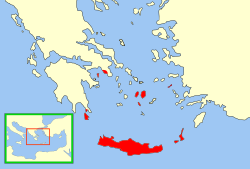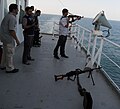Portal:Piracy
Introduction

Piracy is an act of robbery or criminal violence by ship or boat-borne attackers upon another ship or a coastal area, typically with the goal of stealing cargo and other valuable goods. Those who conduct acts of piracy are called pirates, and vessels used for piracy are called pirate ships. The earliest documented instances of piracy were in the 14th century BC, when the Sea Peoples, a group of ocean raiders, attacked the ships of the Aegean and Mediterranean civilisations. Narrow channels which funnel shipping into predictable routes have long created opportunities for piracy, as well as for privateering and commerce raiding.
Historic examples of such areas include the waters of Gibraltar, the Strait of Malacca, Madagascar, the Gulf of Aden, and the English Channel, whose geographic structures facilitated pirate attacks. The term piracy generally refers to maritime piracy, although the term has been generalized to refer to acts committed on land, in the air, on computer networks, and (in science fiction) outer space. Piracy usually excludes crimes committed by the perpetrator on their own vessel (e.g. theft), as well as privateering, which implies authorization by a state government.
Piracy or pirating is the name of a specific crime under customary international law and also the name of a number of crimes under the municipal law of a number of states. In the 21st century, seaborne piracy against transport vessels remains a significant issue, with estimated worldwide losses of US$25 billion in 2023, increased from US$16 billion in 2004. (Full article...)
Selected biography -
William Kidd (c. 1645 – 23 May 1701), also known as Captain William Kidd or simply Captain Kidd, was a Scottish privateer. Conflicting accounts exist regarding his early life, but he was likely born in Dundee and later settled in New York City. By 1690, Kidd had become a highly successful privateer, commissioned to protect English interests in North America and the West Indies.
In 1695, Kidd received a royal commission from the Earl of Bellomont, the governor of New York, Massachusetts Bay and New Hampshire, to hunt down pirates and enemy French ships in the Indian Ocean. He received a letter of marque and set sail on a new ship, Adventure Galley, the following year. On his voyage he failed to find many targets, lost much of his crew and faced threats of mutiny. In 1698, Kidd captured his greatest prize, the 400-ton Quedagh Merchant, a ship hired by Armenian merchants and captained by an Englishman. The political climate in England had turned against him, however, and he was denounced as a pirate. Bellomont engineered Kidd's arrest upon his return to Boston and sent him to stand trial in London. He was found guilty and hanged in 1701. (Full article...)
Selected article -
The Emirate of Crete (Arabic: إقريطش, romanized: Iqrīṭish or إقريطية, Iqrīṭiya; Greek: Κρήτη, romanized: Krētē) was an Arab Islamic state that existed on the Mediterranean island of Crete from the late 820s to the reconquest of the island by the Byzantine Empire in 961. Although the emirate recognized the suzerainty of the Abbasid Caliphate and maintained close ties with Tulunid Egypt, it was de facto independent.
A group of Arab Andalusian exiles led by Abu Hafs Umar al-Iqritishi conquered Crete in either 824 or 827/828, and established an independent Islamic state. The Byzantines launched a campaign that took most of the island back in 842-43 under Theoktistos, but the reconquest was not completed and would soon be reversed. Later attempts by the Byzantine Empire to recover the island failed, and for the approximately 135 years of its existence, the emirate was one of the major foes of Byzantium. Crete commanded the sea lanes of the Eastern Mediterranean and functioned as a forward base and haven for Muslim corsair fleets that ravaged the Byzantine-controlled shores of the Aegean Sea. The emirate's internal history is less well known, but all accounts point to considerable prosperity deriving not only from piracy but also from extensive trade and agriculture. The emirate was brought to an end by Nikephoros Phokas, who successfully campaigned against it in 960–961, re-annexing the island to the Byzantine Empire. (Full article...)
Did you know?
- ... that Pixel Piracy's developers released a free torrent of their game?
- ... that the developers of Hotline Miami 2: Wrong Number suggested that Australian customers pirate their game?
- ... that since 1904 the Gasparilla Pirate Festival in Tampa, Florida, has featured a pirate-themed parade?
- ... that Black Sheep Radio dedicated its first day of programming to a fallen pirate?
- ... that HMS Redpole, one of the aptly-named coffin brigs, sank in an action with a pirate vessel in August 1828?
- ... that a search engine for pirated books has been used to train large language models?
- ... that, unlike traditional Western societies of the time, many pirate clans operated as limited democracies, demanding the right to elect and replace their leaders?
- ... that in 2011, pirates were reported as raiding along the Danube River in the center of Europe?
- ... that, while it is unknown if pirates actually kept parrots as pets, it is thought that at least some captains kept cats aboard to keep populations of rats and other vermin down?
Selected quotations
| “ | Come all you brave Boys, whose Courage is bold, Will you venture with me, I'll glut you with Gold? Make haste unto Corona, a Ship you will find, That's called the Fancy, will pleasure your mind. Captain Every is in her, and calls her his own; |
” |
| — A Copy of Verses, Composed by Captain Henry Every (1696) | ||
General images
Selected Jolly Roger

Subcategories
Topics
WikiProjects
Related portals
Things you can do

Contribute
- Work on piracy and pirate articles and help improve them to featured articles.
Expand
Join
WikiProject Piracy Requests
- eliminate red links from List of pirates
- expand Timeline of piracy, specifically to fill in vast gap between the 1890s to 2000s
- revise Bartholomew Roberts
- help with Requested articles and Expand articles
- help with Portal:Piracy
Associated Wikimedia
The following Wikimedia Foundation sister projects provide more on this subject:
-
Commons
Free media repository -
Wikibooks
Free textbooks and manuals -
Wikidata
Free knowledge base -
Wikinews
Free-content news -
Wikiquote
Collection of quotations -
Wikisource
Free-content library -
Wikiversity
Free learning tools -
Wiktionary
Dictionary and thesaurus














































































































